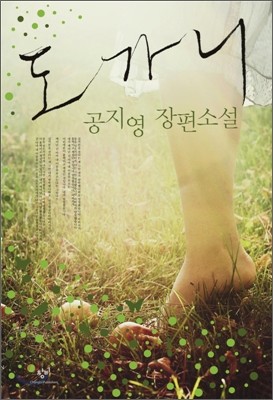[RUSSIAN] The Journey through the Fog: The Crucible by Gong Ji-Young
by Aleksandra Tsibulia , on September 14, 2022
- English(English)
Gong Ji-young is a well-known Korean writer. In 2021, her famous novel The Crucible (2009) was translated into Russian. It is not her first book available in Russian. In 2020, the novel Our Happy Time (2005) was also published in Moscow.
The main character of The Crucible is a young man from Seoul—Kang In-ho. After his business fails, his family falls into financial difficulty. His wife asks her classmate to find a job for her unemployed husband, and her friend informs her of a private school in Mujin headed by her uncle. Actually, you can’t find the name of this city on a map of South Korea because it is fictional, but the plot of the novel is based on a real story that took place in the Gwangju Inhwa School for hearing-impaired students. Over the course of several years, school teachers, administrators, and a principal raped children there.
Kang is thirty-three years old. This age seems to be symbolic, because it reminds one of Christ. Readers can feel that something important is going to happen with the protagonist, something that may rock his world or even destroy him. Another allusion is to Divine Comedy in which Dante finds himself “half way through the journey of our life [. . .] in a gloomy wood, because the path which led aright was lost.” This place, where boys and girls are tortured, could be called Inferno, but the difference is that children are sinless. Kang plunges into a world of fear, mystery, ghosts, and hidden violence. This journey makes him face his own past, which he had tried to forget. In this way he starts to struggle for the children and discovers his purpose.
The city is described as a locus of the uncanny. For example, one of the repeated images is the fog. It is compared to an enormous monster, seaweed, a mouth, a can of milk, the tousled hair of a ghost. This fog has the power to hide all the sordid and dreadful secrets. In this respect, it is similar to the invincible machine of bureaucratic procedures, corrupt police, and state institutions that wish to conceal the truth.
It is necessary to say that some of the metaphors the author invents are quite innovative and fresh. For example, when a little boy perishes on a railroad track, run over by a train, his body is “tossed high into the air, weightless as popcorn.” This heartbreaking scene made me think about the fragment from The Red Laugh (1904) by Russian writer Leonid Andreyev. In that text a person is on the battlefield, but suddenly his head disappears, and “blood flows as if it was an uncorked wine bottle.” The mechanism of creating these metaphors is the same and is reminiscent of Theodor Adorno's point that death turns individuals into things.
Sometimes Gong Ji-young writes about the strong emotions of her characters by describing the food they eat and its disgusting metamorphosis. The pale light coming through the fog in this novel has “the color of mayonnaise,” the sun is turned into “a lingering bruise,” and the boarding school is represented as “a place more eerie than a slaughter-house.”
I read this book in Russian and it seems to me that the translation has some flaws. This novel is a contemporary text written in the twenty-first century, and many relevant and timely subjects are mentioned or referred to here (the Me Too movement, feminism, cyber-bullying), but the chosen vocabulary is a bit archaic. Sometimes the translator uses vernacular expressions, idiomatic phrases or words taken from the nineteenth or the middle of the twentieth century, which are not common today. The protagonist comes from Seoul, the capital, but in the Russian version he utilizes words that are spoken only in small towns today.
The Crucible is a powerful book that really influenced Korean society. The novel was adapted into a film, which prompted authorities to relaunch an investigation, resulting in the closure of the school. The work even led to legislation being enacted.
I suppose that this book is not only about the specific case that took place in South Korea. There are many custodial institutions all over the world where people are vulnerable, fragile, and often practically invisible. All these voices should be heard.
Aleksandra Tsibulia
Poet, Journey to the Edge of Blood (Russian Gulliver, 2014)
The Ferris Wheel (Jaromír Hladík Press, 2021)
Art and Literary Critic
-
Source : KOREAN LITERATURE NOW, https://www.kln.or.kr/lines/reviewsView.do?bbsIdx=1731
Provider for
Keyword : Суровое испытание,Джиён Кон,Ji-Young Gong,KOREAN LITERATURE NOW,KLN
- Суровое испытание
- Author : Джиён Кон
- Co-Author :
- Translator : Софья Кузина
- Publisher : АСТ Мейнстрим
- Published Year : 2021
- Country : RUSSIAN FEDERATION
- Original Title : 도가니
- Original Language : Korean(한국어)
- ISBN : 9785171220181

- 도가니
- Author : Ji-Young Gong
- Co-Author :
- Publisher : 창작과 비평사
- Published Year : 0
- Country : 국가 > SOUTH KOREA
- Original Language : Korean(한국어)
- ISBN : 9788936433703
Translated Books8 See More
-
Chinese(繁體) Book熔爐
-
English(English) BookTogani
-
French(Français) BookLes enfants du silence
E-News7 See More
-
Chinese(简体) Others《熔炉》出版十周年,韩国的性别平等情况变好了吗?丨专访《熔炉》作者孔枝泳
-
Russian(Русский) OthersКон Джиён «Суровое испытание»
-
Chinese(简体) Others反思韩国何以产生熔炉法(韩国的《熔炉法》是怎么成立的)


